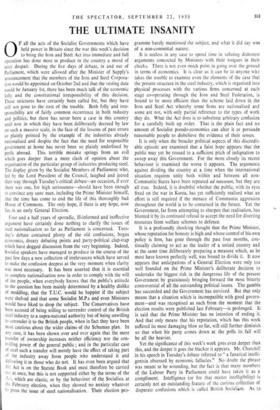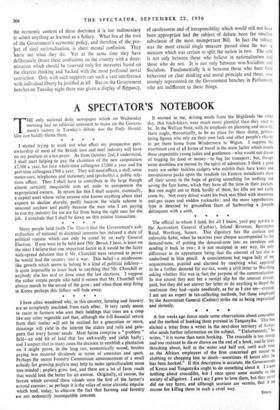THE ULTIMATE INSANITY
0 F all the acts of the Socialist Governments which have held power in Britain since the war this week's decision to bring the Iron and Steel Act into immediate and full operation has done most to produce in the country a mood of utter despair. During the five days of debate, in and out of Parliament, which were allowed after the Minister of Supply's announcement that the members of the Iron and Steel Corpora- tion would be appointed on October 2nd and that the vesting date would be January 1st, there has been much talk of the economic folly and the constitutional irresponsibility of this decision. These strictures have certainly been called for, but they have still not gone to the root of the trouble. Both folly and irre- sponsibility are of fairly common occurrence in both industry and politics, but there has never been a case in this country until now in which they have been deliberately decreed by law on such a massive scale, in the face of the lessons of past errors so plainly pointed by the example of the industries already nationalised and despite the fact that the need for responsible government at home has never been so plainly underlined by perils abroad. This terrible mistake springs from an evil which goes deeper than a mere clash of opinion about the organisation of the particular group of industries producing steel. The display given by the Socialist Members of Parliament who, led by the Lord President of the Council, laughed and jeered their way through Tuesday's critical debate—an occasion, if ever there was one, for high seriousness—should have been enough to convince any sane man, including the Prime Minister himself, that the time has come to end the life of this thoroughly bad House of Commons. The only hope, if there is any hope, now lies in an early General Election.
Four and a half years of sporadic, ill-informed and ineffective argument have certainly done nothing to clarify the issues of steel nationalisation so far as Parliament is concerned. Tues- day's debate contained plenty of the old confusions, bogus economics, dreary debating points and party-political clap-trap which have dogged discussion from the very beginning. Indeed. Socialist speakers have managed to produce in the course of the past few days a new collection of irrelevances which have served to make the confusion deepest at the very moment when clarity was most necessary. It has been asserted that it is essential to complete nationalisation now in order to comply with the will of the people, when everybody knows that the public's attitude to the question has been mainly determined by a healthy dislike of meddling, that the T.U.C. would be happier if the subject were shelved and that some Socialist M.P.s and even Ministers would have liked to drop the subject. The Conservatives have been accused of being willing to surrender control of the British steel industry to a supra-national authority but of being unwilling to surrender it to the British people, when in fact they have been most cautious about the wider claims of the Schuman plan. In any case, it has been shown over and over again that the mere transfer of ownership increases neither efficiency nor the con- trolling power cif the general public ; and in the particular case of steel such a transfer will merely have the effect of taking part of the industry away from people who understand it and delivering it to those who do not. It has even been argued that the Act is on the Statute Book and must therefore be carried out at once, but this is not supported either by the terms of the Act, which are elastic, or by the behaviour of the Socialists at the February election, when they showed no anxiety whatever to press the issue of steel nationalisation. Their election pro- gramme barely mentioned the subject, and what it did say was of a non-committal nature.
It is useless in any case to spend time in refuting dishonest arguments concocted by Ministers with their tongues in their cheeks. There is not even much point in going over the ground in terms of economics. It is clear as it can be to anyone who takes the trouble to examine even the elements of the case that the present structure in the steel industry, which is organised into physical processes with the various firms concerned at each stage co-operating through the Iron and Steel Federation, is bound to be more efficient than the scheme laid down in the Iron and Steel Act whereby some firms are nationalised and some are not, with only partial reference to the types of work they do. What the Act does is to substitute arbitrary confusion for a carefully built up order. That is the plain fact and no amount of Socialist pseudo-economics can alter it or persuade reasonable people to disbelieve the evidence of their senses.
It is only when the broader political aspects of this discredit- able episode are examined that a faint hope appears that the public may yet be roused to a sufficient pitch of indignation to sweep away this Government. For the more closely its recent behaviour is examined the worse it appears. The arguments against dividing the country at a time when the international situation requires unity both within and between all non- Communist States have been repeated ad nauseam, but they are all true. Indeed, it is doubtful whether the public, with its eyes fixed on the war in Korea, has yet sufficiently realised what an effort is still required if the menace of Communist aggression throughout the world is to be contained in the future. Yet the Government, far from attempting to sharpen that realisation, has blunted it by its continued refusal to accept the need for diverting resources from welfare schemes to defence.
It is a profoundly shocking thought that the Prime Minister, whose reputation for honesty is high and whose control of his own policy is firm, has gone through the past four months, con- tinually claiming to act as the leader of a united country and at the same time deliberately preparing a measure which, as he must have known perfectly well, was bound to divide it. It now appears that anticipations of a General Election were only too well founded on the Prime Minister's deliberate decision to undertake the biggest risk in the dangerous life of the present Government by gratuitously bringing forward the most bitterly controversial of all the outstanding political issues. The gamble has succeeded and the Government has survived. But that only means that a situation which is incompatible with good govern- ment—and was recognised as such from the moment that the election results were published last February—is prolonged. It is said that the Prime Minister has no intention of ending it. And that only means that his reputation, which has this week suffered its most damaging blow so far, will still further diminish so that when his party comes down at the polls its fall will be all the heavier.
Yet the significance of this week's work goes even deeper than this, and the deeper it goes the blacker it appears. Mr. Churchill in his speech in Tuesday's debate referred to " a fanatical intelli- gentsia obsessed by economic fallacies." No doubt the phrase was meant to be wounding, but the fact is that many members of the Labour Party in Parliament could have taken it as a compliment. Intelligence (or for that matter intelligibility) is certainly not an outstanding feature of the curious collection of disparate confusions which is called British Socialism. As to the economic content of these doctrines it is too rudimentary to admit anything as learned as a fallacy. What lies at the root of the Government's economic policy, and therefore of the pro- ject of steel nationalisation, is sheer mental confusion. They know not what they do. Yet at the same time they have deliberately thrust these confusions on the country with a deter- mination which should be reserved only for measures based on the clearest thinking and backed with the most profound moral conviction. Only with such supports can such a vast interference with individual liberty be justified at all. But on the Government benches on Tuesday night there was given a display of flippancy, of carelessness and of irresponsibility which would still not have been appropriate had the subject of debate been the smallest sub-clause of the most unimportant Bill. In fact the subject was the most crucial single measure passed since the war—a measure which was certain to split the nation in two. The split is not only between those who believe in nationalisation and those who do not. It is not only between non-Socialists and Socialists. Fundamentally it is between those who base their behaviour on clear thinking and moral principle and those, now strongly represented on the Government benches in Parliament, who are indifferent to these things.







































 Previous page
Previous page